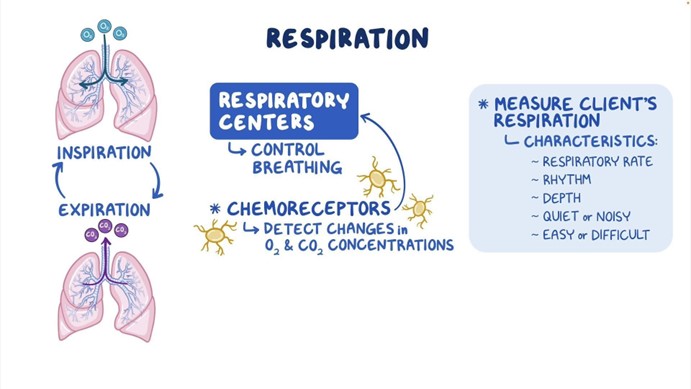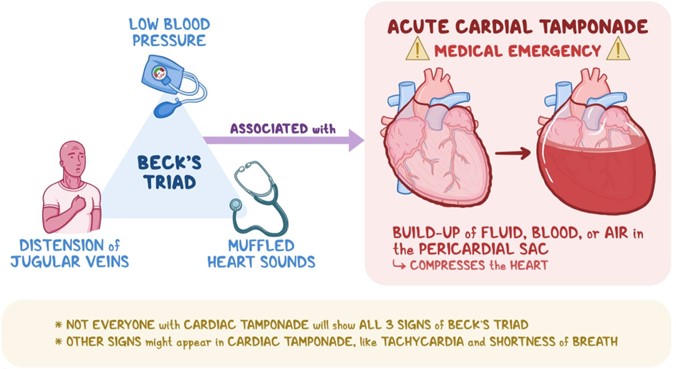The nurse is caring for a postoperative client who has a chest tube connected to suction and a water seal drainage system. Which of the following indicates to the nurse that the chest tube is functioning properly?
Equal amount of fluid drainage in each collection chamber
Fluctuation of the fluid level within the water seal chamber
Continuous bubbling within the water seal chamber
Absence of fluid in the drainage tubing
The Correct Answer is B
Choice A Reason: Equal amount of fluid drainage in each collection chamber is not a sign of proper chest tube function. The amount of fluid drainage depends on the type and extent of the client's injury or surgery, and may vary from one chamber to another.
Choice B Reason: Fluctuation of the fluid level in the water seal chamber (tidaling) indicates that the chest tube is functioning properly. This fluctuation corresponds with the client's respirations and shows that air or fluid is being effectively removed from the pleural space.
Choice C Reason:Continuous bubbling within the water seal chamber: Continuous bubbling in the water seal chamber indicates an air leak, which is not normal unless the client has a pneumothorax and air is being evacuated. Otherwise, it suggests a problem with the system.
Choice D Reason: Absence of fluid in the drainage tubing is not a sign of proper chest tube function. It may indicate that the chest tube is obstructed, kinked, or clamped, or that the suction is not working properly. The nurse should assess and troubleshoot the chest tube system.

Nursing Test Bank
Naxlex Comprehensive Predictor Exams
Related Questions
Correct Answer is D
Explanation
Choice A Reason: This choice is incorrect because flatened neck veins are not a sign of cardiac tamponade. Cardiac tamponade is a condition in which fluid accumulates in the pericardial sac that surrounds the heart, causing compression and impaired filling of the heart chambers. This leads to reduced cardiac output and hypotension. One of the manifestations of cardiac tamponade is distended neck veins due to increased venous pressure and impaired venous return.
Choice B Reason: This choice is incorrect because bradycardia is not a sign of cardiac tamponade. Bradycardia is a condition in which the heart rate is slower than normal (less than 60 beats per minute). It may be caused by various factors such as vagal stimulation, medication side effects, hypothyroidism, or sinus node dysfunction. It may cause symptoms such as fatigue, dizziness, or syncope, but it does not indicate cardiac tamponade.
Choice C Reason: This choice is incorrect because sudden lethargy is not a specific sign of cardiac tamponade. Lethargy is a condition in which the person feels tired, sluggish, or drowsy. It may be caused by various factors such as sleep deprivation, depression, infection, anemia, or hypoglycemia. It may affect the person's mental and physical performance, but it does not indicate cardiac tamponade.
Choice D Reason: This choice is correct because muffled heart sounds are a sign of cardiac tamponade. Muffled heart sounds are heart sounds that are fainter or softer than normal due to reduced transmission of sound waves through fluid-filled pericardial sac. They may indicate that the heart function is compromised by cardiac tamponade and require immediate intervention such as pericardiocentesis (removal of fluid from pericardial sac).

Correct Answer is C
Explanation
Choice A Reason: This is incorrect because a pneumothorax is a condition in which air enters the pleural space and causes the lung to collapse. It does not cause the chest wall to move inward and outward paradoxically.
Choice B Reason: This is incorrect because atelectasis is a condition in which alveoli collapse and cause reduced gas exchange. It does not cause the chest wall to move inward and outward paradoxically.
Choice C Reason: This is correct because flail chest is a condition in which multiple ribs are fractured and cause a segment of the chest wall to detach from the rest of the thoracic cage. It causes the chest wall to move inward and outward paradoxically, as well as dyspnea and pain.
Choice D Reason: This is incorrect because a hemothorax is a condition in which blood enters the pleural space and causes the lung to collapse. It does not cause the chest wall to move inward and outward paradoxically.
Whether you are a student looking to ace your exams or a practicing nurse seeking to enhance your expertise , our nursing education contents will empower you with the confidence and competence to make a difference in the lives of patients and become a respected leader in the healthcare field.
Visit Naxlex, invest in your future and unlock endless possibilities with our unparalleled nursing education contents today
Report Wrong Answer on the Current Question
Do you disagree with the answer? If yes, what is your expected answer? Explain.
Kindly be descriptive with the issue you are facing.
